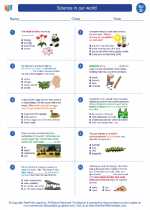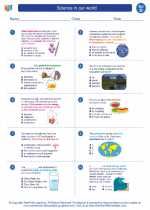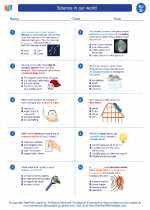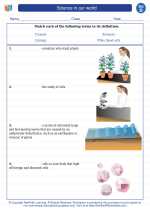Sensory Organs
Sensory organs are specialized parts of the body that help us perceive the world around us through various senses such as sight, hearing, touch, taste, and smell.
Types of Sensory Organs
There are five main types of sensory organs:
- Eyes (Vision): The eyes contain photoreceptor cells that help us see and perceive light and color.
- Ears (Hearing): The ears contain auditory receptors that allow us to hear and perceive sound vibrations.
- Skin (Touch): The skin contains tactile receptors that enable us to feel touch, pressure, and temperature.
- Tongue (Taste): The tongue contains taste buds that help us discern different tastes such as sweet, sour, salty, and bitter.
- Nose (Smell): The nose contains olfactory receptors that allow us to detect and distinguish various scents and odors.
Functions of Sensory Organs
The sensory organs play crucial roles in helping us interpret and understand the world around us. Their functions include:
- Receiving and detecting external stimuli
- Transmitting sensory information to the brain
- Interpreting sensory signals to create perceptions
- Helping us respond to the environment
Importance of Sensory Organs
Our sensory organs are essential for our survival and everyday experiences. They allow us to navigate our surroundings, communicate with others, and enjoy the pleasures of life through our senses.
Study Tips
To study sensory organs effectively, consider the following tips:
- Understand the structure and function of each sensory organ
- Learn about the types of receptors present in each sensory organ
- Explore how sensory information is processed and transmitted to the brain
- Practice using your senses to observe and identify stimuli in your environment
- Engage in activities that stimulate and challenge your sensory perception
◂Science Worksheets and Study Guides Fourth Grade. Science in our world
Study Guide Science in our world - 4th gr.
Science in our world - 4th gr.  Worksheet/Answer key
Worksheet/Answer key Science in our world - 4th gr.
Science in our world - 4th gr.  Worksheet/Answer key
Worksheet/Answer key Science in our world - 4th gr.
Science in our world - 4th gr.  Worksheet/Answer key
Worksheet/Answer key Science in our world - 4th gr.
Science in our world - 4th gr.  Vocabulary/Answer key
Vocabulary/Answer key Science in our world - 4th gr.
Science in our world - 4th gr. 

 Worksheet/Answer key
Worksheet/Answer key
 Worksheet/Answer key
Worksheet/Answer key
 Worksheet/Answer key
Worksheet/Answer key
 Vocabulary/Answer key
Vocabulary/Answer key

The resources above cover the following skills:
History and Nature of Science: A student should understand the history and nature of science. A student who meets the content standard should:
Develop an understanding that historical perspectives of scientific explanations demonstrate that scientific knowledge changes over time, building on prior knowledge.
Develop an understanding that scientific knowledge is ongoing and subject to change as new evidence becomes available through experimental and/or observational confirmation(s).